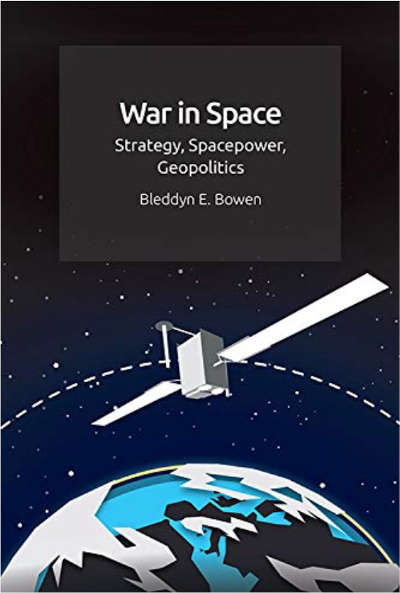In the picture
Cover of Bleddyn E. Bowen's book 'War in Space. Strategy, Spacepower, Geopolitics' (Edinburgh: Edinburgh University Press, 2020) 316 pp.
Geopolitics speaks of continental powers and maritime powers: those preeminent countries, respectively, whose power is based on the Army, because they are inserted in a continent and historically rival neighbors, or on the Navy, because they are isolated and project influence over others across the ocean. The Welshman Bleddyn Bowen, professor of International Relations at the University of Leicester, develops the concept of space power, compatible with the previous categories, since it is the "entity that uses outer space for its political objectives", and this can be done by both Russia and the United States, to mention the two countries that are paradigms of the two classic modalities of hard power.
Unlike other researchers who have dealt with 'astropolitics'-Bowen refers several times to Dolman, author of the seminal book 'Astropolitik. Classical Geopolitics in the Space Age' (2002) - 'War in Space' shies away from what it considers science fiction. There may come a day when mankind colonizes other planets and civilization spreads throughout the universe; then this 'astropolitics' will be born: the imperative interests of the great powers will take into account the sidereal space, through which they will move. In the meantime, Bowen argues, what has begun is the time of space power, a magnitude that is integrated into the current command of the powers: space certainly acquires a capital importance, insofar as military systems today depend on satellites, but the objectives of wars will continue to be linked to the Earth, which is where men and women live.
Bowen constructs a theory of that space power ('spacepower', now written in one word), which consists of "the capabilities designed to control, deny, exploit and regulate the use of space"; in other words, "the use of the military and economic advantages of outer space for strategic purposes". The book is suggestive (if not excessively prolix), and its main thesis is useful for practical strategic thinking: today, and also in the medium term, the outer space of operational interest is that of the Earth's orbit, and this functions for military strategy purposes as another coastline, since it is reachable from the Earth's surface with anti-satellite weapons (deep space, on the other hand, would be assimilated to the ocean). This parallel with the dynamics at sea is drawn by Bowen in examining Mahan and Corbett's theory of maritime power; he draws on the insights of these naval strategists to elucidate the principles of space power.
In this exercise, Bowen presents seven propositions: I) space war is fought over space dominance; II) space power is exclusively infrastructural and connected to the Earth; III) space dominance does not equate to Earth dominance; IV) space dominance manipulates celestial lines of communication; V) Earth orbit is a cosmic coastline suitable for strategic maneuvering; VI) space power exists within a geocentric mindset; and VII) space power is dispersed and imposes dispersion on the Earth.
Interesting in this approach is that as far-reaching and decisive as satellite technology is - and will increasingly become - its location outside of terrestrial or maritime space does not place it in a domain on the margins. "Space cannot be viewed in isolation, as Earth orbit is simply the Earth's coastline and not a vast and separate ocean," Bowen writes. "As a littoral zone suitable for strategic maneuvering, space power in Earth orbit resembles the use of maritime power by continental states, rather than maritime powers."
In contrast to authors who look much further ahead in time and think of an era of space travel and colonies on other planets, Bowen admits that perhaps one day there may be an 'astrodeterminism', but warns that for the time being - and for a long time - geocentrism will continue to persist. "Space power will remain geocentric as long as the Earth remains humanity's sole center of life and civilization. What happens in space will ultimately written request matter only in how it affects life and strategies on Earth," he argues.
The lucidity in Bowen's approach is served, however, with a narrative that is not very accessible. The book collects his doctoral thesis ; he should have lightened it of many specificities, that perhaps were of interest for the academic instances to which he had to convince, but in reality they are redundant at the time of validating the exposed theory. On the other hand, if it is true that for the wars of our era space beyond the Earth's orbit does not count, the trips to the Moon and Mars and the efforts for a future exploitation of the minerals of the asteroids are already today elements of strategic dispute between the powers (call it 'astropolitics' or whatever you want), which should not be completely left aside when it comes to a theory on 'spacepower'.

